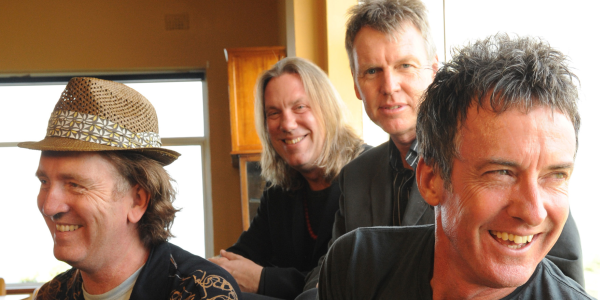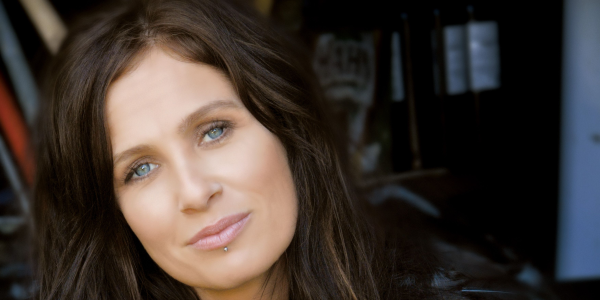Influenced by the surf and progressive rock sounds of the 70s, the band is evolving as we speak
Despite his upbringing on Sydney’s surf-rich northern beaches, and his life-long love of surf music, Rob Hirst admits to never having taken to surfing. “I started out a very inept surfer, and I have remained so to the present day,” Hirst laughs. “I think you have to dedicate your life to surfing or music, but you can’t do both – I’ve spent my life playing music, so I haven’t had the time to learn how to surf.” Unsurprisingly Hirst spent his teenage years surrounded by surfers, not all of who graduated beyond the Church of the Open Sky. “I had a lot of friends at school who were keen surfers, but they didn’t do well at school, mysteriously!” he laughs.
After playing in various long-forgotten teenage bands, Hirst formed Farm with fellow northern beach resident Jim Moginie. Later on, while he was studying law at Sydney University, Farm drafted the then blonde haired law student Peter Garrett. Farm had started out influenced by the surf and progressive rock sounds of the early 1970s; by the mid-1970s Farm had traded in their surf aesthetic for the tough, pub rock sound and a sharp-tongued political edge that would become the hallmark of Midnight Oil.
35 years later, and Hirst, Moginie and fellow Midnight Oil guitarist Martin Rotsey have returned to their surf roots with the surf instrumental project The Break. Listening to psychedelic surf tones of The Break – whose membership is rounded out by Violent Femmes bass player (and now resident Taswegian) Brian Ritchie – it’s easy to see the band as the logical extension of Farm and Midnight Oil.
“There’s definitely a chronological link because we started out playing the northern beaches,” Hirst admits. The presence of the unrecorded track Farm in the The Break’s set list affirms that chronological link. “Not many people realise the link with that song,” he replies, when asked if the song is a reference to Midnight Oil’s predecessor outfit. “We did call it after our first band – and I really love playing that song. There’s also a surf break called The Farm, so there’s a nice link on two fronts.”
Australia retains a critical role in the genesis and evolution of surf music, most notably through 1960s Australian surf rock band The Atlantics, whose song Bombora remains one of the seminal tracks of the surf rock genre.
Later on, American bands such as Jan And Dean, The Rivieras and The Beach Boys imbued surf music with a Californian pop sensibility. To Hirst, however, the Australian surf music sound was a unique product of surf and pub rock culture. “I think Australian surf music is different because of that certain kind of crunch and grunt and brutality that comes with surviving the pubs and clubs of the late 1970s and early 1980s,” he says.
But whereas Midnight Oil indulged and epitomised – especially in their first ten years – the Australian pub rock scene, The Break seem to be edging further back in musical history, infecting the basic surf sound with a psychedelic edge that’s more 1968 than 1978. “That psychedelic aspect has become more part of the band’s live performance,” Hirst explains. “People who’re coming to The Forum to see us in October will see Jim going crazy on the theremin and oscillator. The Break, certainly live, is becoming a psychedelic surf rock spaghetti western sci-fi band,” he chuckles. “The idea behind the band was that we’d create this surf band and mix it with all these other genres.”
Like other niche genres, surf music has its purists, zealous punters who’re more than happy to rule bastardisations of the genre out of the genre’s fundamental scope. Hirst hasn’t been confronted with any angry surf purists, but he’s had experience with the phenomenon in other musical arenas. “It was a bit like that when I was playing in The Backsliders. People used to come up to us after a show and say ‘I like what you’re playing, but you’re not really doing blues’,” Hirst recalls. “Dom Turner used to call them ‘the beards’,” he laughs.
The Break’s debut album, Church Of The Open Sky – the title of which is taken from the term used by surfers to describe the natural environment – features songs named after various surf beaches around Australia. Hirst says there are still many more obscure surf beaches around the country for the band to draw inspiration from. “There’s plenty more if you go online and look at the lists,” he admits. “Based on the number of surf beaches, I reckon we’ve probably got about 20 albums to go, and that’s just within Australia,” he laughs.
Hirst is very keen for The Break to return to the studio to record more tracks – not just on account of the number of surf beaches left for song titles. “I’m having a really great time in this band,” he admits. “I said to everyone the other day that we should start recording again.” Part of Hirst’s enthusiasm derives from the dynamism current permeating The Break. “The band is evolving as we speak,” Hirst points out. “We’ve all got it in the back of our minds where we’d like it to go. We want to take what we did on Church Of The Open Sky and take it into more bastardised forums.”
Unfortunately Midnight Oil lead singer, and now Government MP, Peter Garrett still hasn’t had an opportunity to see his former bandmates’ new outfit. “Peter’s had a few other things on his mind recently, so he hasn’t had time to come and see us” Hirst laughs. “But if he did come along, I think he’d really like the band.”
THE BREAK join DENGUE FEVER and JOHNNIE & THE JOHNNIE JOHNNIES at the Becks Festival Bar at The Forum on Saturday October 16. Tickets from ticketmaster.com.au or 1300 723 038. Church Of The Open Sky is out now through Bombora.







